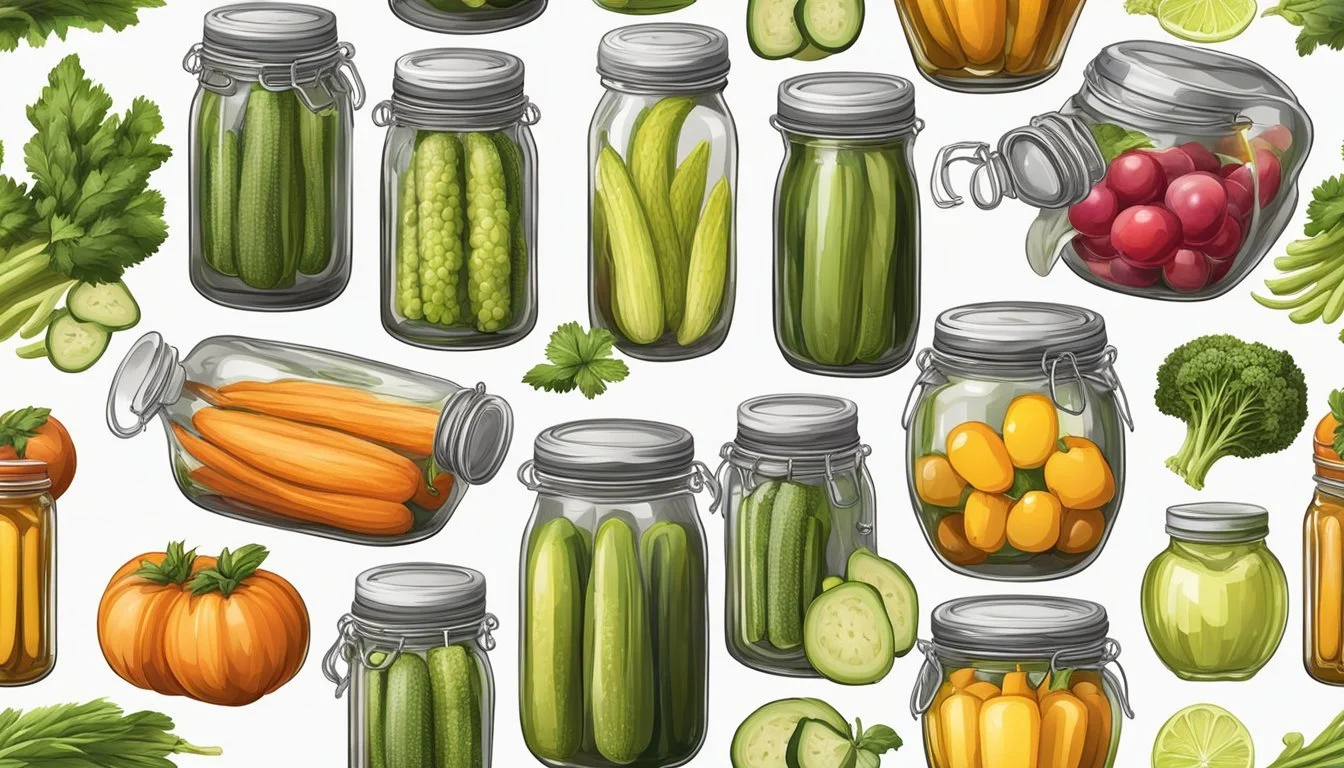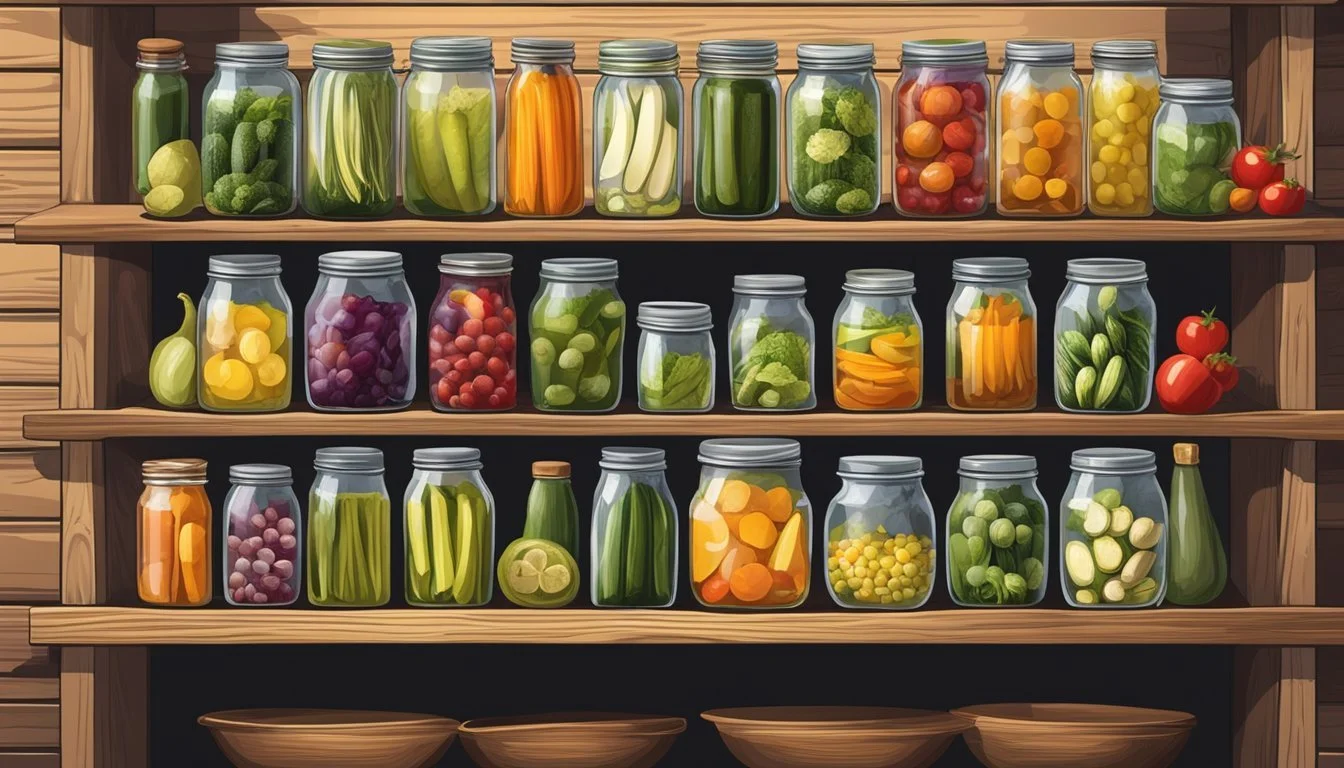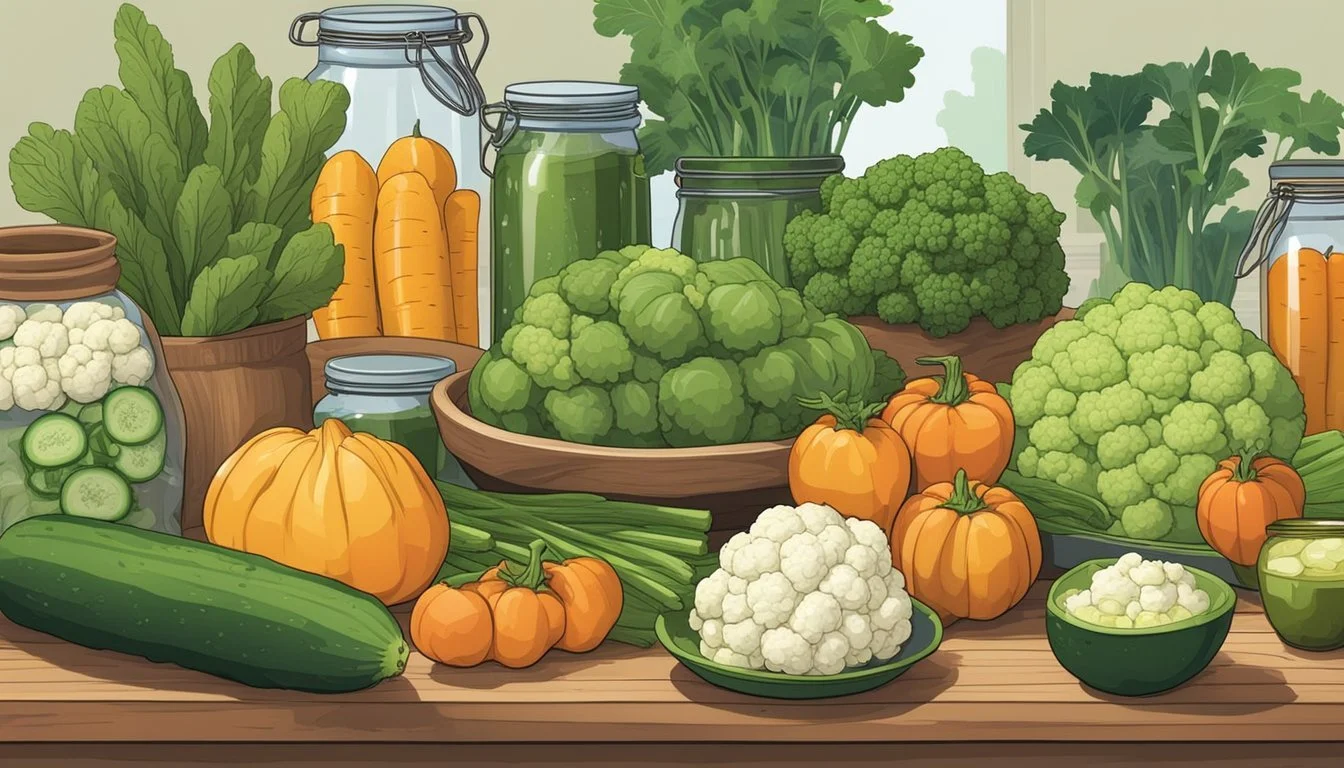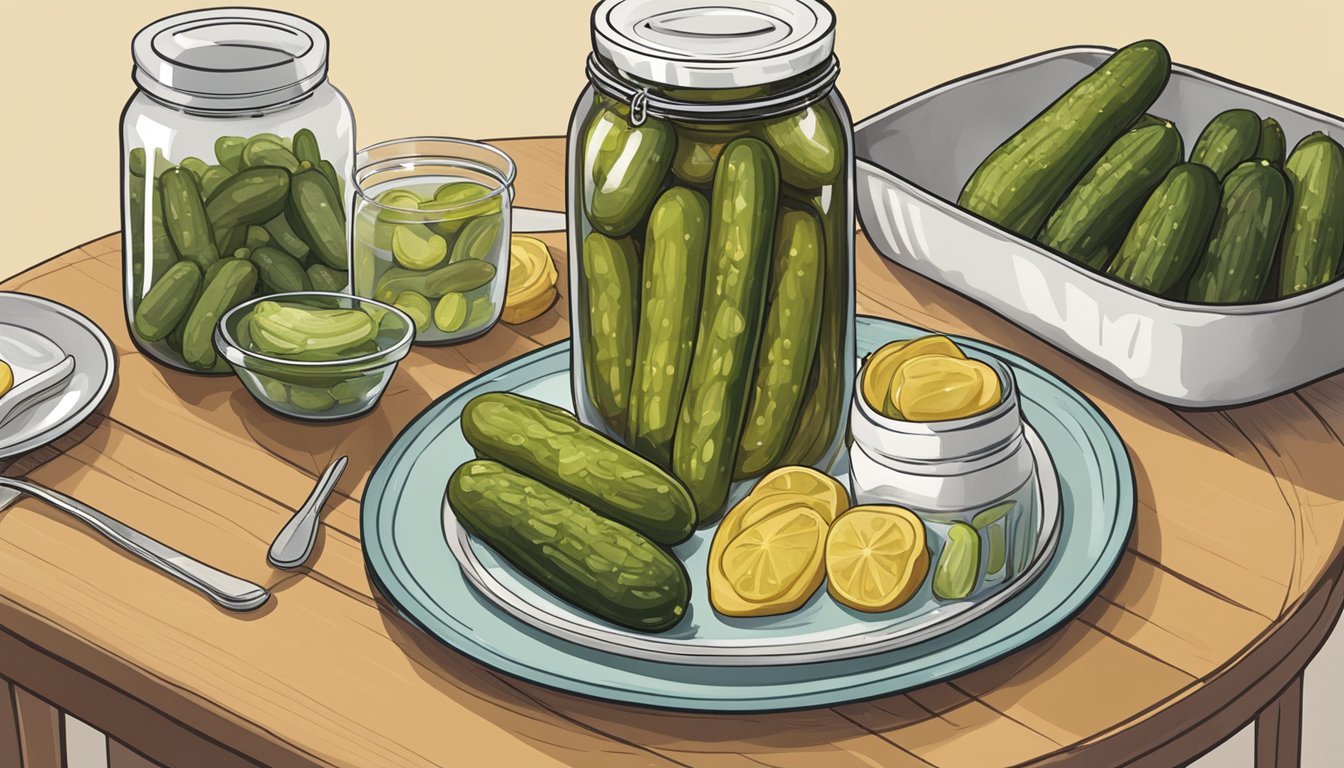Pickles Substitutes
Best Alternatives for Tangy Flavor
For those who enjoy the tangy crunch of pickles but find themselves without a jar in the pantry, there are numerous substitutes to consider that can seamlessly stand in for pickles in a variety of dishes. Some of these alternatives might even surprise you. Using readily available ingredients like cucumbers, vinegar, sugar, and salt, it's possible to recreate the signature tart and sweet flavor profile of pickles at home.
For a touch of sweet pickle relish, a simple mixture of chopped cucumbers and a sprinkle of sugar can offer a similar texture and flavor. Marinating celery stalks in wine vinegar and olive oil, seasoned with garlic and onion, is another flavorful substitute that works well in salads, burgers, and sandwiches.
Capers provide a unique twist with their salty, tangy, and slightly lemony taste. These small, green flower buds can be used in place of pickles to add a zesty kick to dressings and dips. Experimenting with these substitutes not only can save a trip to the store, but also might reveal new favorite flavors and textures for your culinary creations.
The Role of Pickles in Culinary Practices
Pickles add unique flavors and textures to a variety of dishes. This section explores their versatility, focusing on their use as condiments and key ingredients in salads and sandwiches.
Pickles as a Condiment
Pickles serve as quintessential condiments, offering a balance of acidity, saltiness, and sometimes sweetness. Dill pickles are often featured alongside burgers and hot dogs, providing a sharp tang that enhances the savory flavors.
Sweet pickle relish, a staple for hot dogs and potato salads, combines cucumbers with sugar, providing a mild sweetness and crunch. The synergy between vinegar and spices in these pickled products enriches the taste experience, adding depth and complexity to simple dishes.
Pickles in Salads and Sandwiches
When incorporated into salads and sandwiches, pickles introduce a distinctive bite. In potato salads, chopped pickles or sweet pickle relish offer a refreshing contrast to the creaminess. Dill pickles find their place in tuna, egg, and chicken salads, balancing richness with their sour notes.
In sandwiches, the crunchiness of pickles adds texture, enhancing meats and cheeses. From classic Reuben sandwiches to simple ham and cheese, the inclusion of pickles elevates the flavor profile, making each bite more satisfying and vibrant.
Understanding Pickle Substitutes
When looking for alternatives to pickles, it's essential to consider factors such as flavor profiles and textures. Different substitutes cater to various dishes and preferences, making it crucial to find the right match for your needs.
Criteria for Suitable Substitutes
Choosing a good substitute for pickles depends on several factors. Flavor profile is a primary consideration. Tangy, acidic, and slightly sweet flavors are common in pickles, so finding alternatives with these tastes is key. Texture is another critical aspect. Pickles often add a crunchy element to dishes, which should be mirrored by the substitute for a similar experience.
The availability and preparation time are additional criteria. Substitutes that are easy to find and quick to prepare are often preferred. Cost can also play a role, especially for more frequent use.
Substitutes Based on Flavor Profile
When matching the flavor profile of pickles, substitutes like caper brine and red ginger work well. Caper brine provides a tangy and acidic flavor similar to pickle juice. It's excellent for adding an extra zing to salads and dressings. Kimchi juice offers a tangy kick but with a different, more complex taste due to fermented vegetables.
For a slightly sweet and tangy option, sweet pickle relish substitutes can be used, such as finely chopped vegetables marinated in wine vinegar. These alternatives maintain the sweet flavor while providing the necessary tanginess.
Substitutes Based on Texture
In terms of texture, crunchy substitutes are ideal. Cucumbers are a popular choice; when marinated in vinegar, salt, and spices, they provide a crunch much like pickles. Celery stalks, similarly marinated, can also replicate the pickle texture while adding a slight sweetness.
Other fresh vegetables, like bell peppers or carrots, can be finely chopped and used as substitutes for sweet pickle relish. They not only provide the desired crunch but also add a hint of their natural flavors. Capers, while smaller, offer a firm texture that can stand in for chopped pickles in various dishes.
Popular Pickle Substitutes
Various ingredients can serve as excellent substitutes for pickles, providing similar tanginess and crunch. These alternatives include vegetable-based options, fruit-based choices, and condiments or sauces that can enhance a variety of dishes.
Vegetable-Based Substitutes
Capers and pickled olives are among the top choices for those seeking a savory and tangy pickle replacement. Capers, often preserved in brine, offer a sharp, salty flavor that complements salads and sandwiches.
Bell peppers and onions, when pickled, provide a sweet yet tangy taste. These are excellent for adding depth to burgers and hot dogs. Diced cucumbers, marinated with salt and vinegar, also serve as a crunchy alternative to traditional pickles.
Other great options include pickled carrots and pickled cabbage, both of which add a refreshing crunch to various dishes.
Fruit-Based Substitutes
Chutneys made from fruits like mango can act as a sweet and spicy replacement for pickles. Mango chutney offers a blend of sweetness, heat, and tanginess, making it ideal for pairing with meats and cheeses.
Cranberry sauce, though less common, provides a unique sweet and sour flavor that can enhance sandwiches and side dishes.
Umeboshi plums, a staple in Japanese cuisine, bring an intense, salty-sweet taste. These plums are perfect for adding complexity to a variety of dishes, from sushi to grilled meats.
Condiment and Sauce Substitutes
Corn relish and sweet pickle relishes are classic condiment options that mimic the taste and texture of pickles. Corn relish often comprises corn kernels, bell peppers, and onions, offering a mix of sweet, sour, and spicy flavors.
Ketchup and chutneys, particularly those that include finely chopped vegetables and fruits, can also serve as effective pickle substitutes. Mango chutney stands out for its versatility and rich flavor, suitable for both savory and sweet dishes.
Sauces like kimchi juice can add a spicy, tangy punch to meals, making them a good option for those looking to vary their flavor profiles.
Creating Substitute Recipes at Home
Homemade pickle substitutes can be created using a variety of ingredients and methods. The following sections highlight vinegar-based alternatives and sugar-and-spice variations, providing detailed instructions for making each at home.
DIY Vinegar-Based Pickle Substitutes
Creating vinegar-based pickle substitutes involves using basic ingredients like water, vinegar, and salt. For a quick and versatile option, chopped dill pickles can be marinated with white vinegar, pickle juice, and a mix of spices.
Ingredients:
1 cup chopped cucumbers
½ cup white vinegar
¼ cup pickle juice
1 teaspoon salt
1 teaspoon mustard seeds
2 cloves minced garlic
Fresh dill
Instructions:
Mix vinegar, pickle juice, and salt in a bowl.
Add chopped cucumbers, mustard seeds, garlic, and dill.
Let it sit for at least 2 hours before using.
These substitutes can replace traditional pickles in salads, sandwiches, and as side dishes.
Making Sugar and Spice Variations
For those who prefer a sweeter flavor, sugar-and-spice variations can be made using chopped cucumbers and a sugar mixture. Homemade sweet pickle relish, for example, combines cucumbers with sugar and spices.
Ingredients:
2 cups chopped cucumbers
1 cup water
½ cup sugar
½ cup vinegar
1 teaspoon salt
1 teaspoon mustard seeds
1 teaspoon dill
Instructions:
Mix water, sugar, vinegar, and salt in a pot.
Bring to a boil and add chopped cucumbers, mustard seeds, and dill.
Simmer for 10 minutes, then let it cool.
This mixture works well as a substitute in recipes calling for sweet pickle relish, adding a balance of sweetness and tanginess. These variations can be used in hot dogs, burgers, and other dishes requiring a touch of sweetness.
Pickles in Special Diets
Pickles are a versatile element in various diets, but constraints like sodium and sugar levels can necessitate substitutions. Certain alternatives can accommodate dietary restrictions better.
Substitutes for Low-Sodium Diets
For individuals on a low-sodium diet, traditional pickles might not be suitable due to the high salt content. One effective substitute involves making your own pickles using vinegar instead of salt. Vinegar-based pickles provide the tangy flavor without adding excess sodium.
Ingredients such as:
unsalted cucumbers
vinegar
herbs (like dill)
spices (like mustard seeds)
These ingredients can create a low-sodium pickle substitute that is easy to prepare and healthier for those monitoring their salt intake.
Commercial options also exist, including products specifically labeled "low-sodium pickles." When selecting these, it's important to read the nutrition labels to ensure they meet dietary requirements.
Pairing Substitutes with Foods
Selecting the right pickle substitute enhances dishes such as salads, hot dogs, hamburgers, deviled eggs, and even cocktails. Below are specific recommendations tailored to each food type, focusing on the most suitable alternatives available.
Substitutes for Salad Dressings and Marinades
When preparing salad dressings or marinades, seasoned rice vinegar mixed with water is a versatile alternative to pickle juice.
Salads: This mixture offers a mellow tang that pairs well with green salads, slaws, and cold vegetables.
Dressings: Incorporate it into vinaigrettes or creamy dressings like Thousand Island for a more balanced taste.
Marinades: For marinating meats, fish, or tofu, the rice vinegar blend adds subtle acidity without overpowering other flavors. Adding herbs such as dill or thyme can elevate the marinade further.
Pickle Substitutes for Hot Dogs and Hamburgers
Cornichons and chopped cucumbers with sugar are excellent replacements for pickles on hot dogs and hamburgers.
Cornichons: Their small size and tangy flavor make them ideal for these dishes, adding a burst of acidity.
Chopped cucumbers + sugar: This combo mimics the sweetness and texture of sweet relish commonly used in toppings.
For those seeking variety, consider using marinated celery stalks or red ginger. Marinated celery provides a unique blend of tang and crunch, while red ginger adds a zingy, refreshing note, especially on fusion-style burgers.
Pickle Substitutes in Deviled Eggs and Cocktails
Sweet pickle relish substitutes like chopped cucumbers + sugar or finely minced capers work well in deviled eggs, providing a similar sweet and tangy profile.
Deviled Eggs: Blend these substitutes into the yolk mixture for a nuanced flavor. Capers add a slight brininess, complementing the creamy texture.
Cocktails: Pickle juice or brine enhances drinks like Bloody Marys. Substitute with a mix of seasoned rice vinegar and water to retain the acidity. Alternatively, add a splash of ume vinegar used in red ginger to cocktails for an exotic twist.
Different substitutes can seamlessly replace pickles, maintaining the essence and enhancing the flavors of various dishes and drinks.
Storage and Preservation of Substitutes
Proper storage and preservation are crucial for maintaining the flavor and safety of pickle substitutes such as those involving vinegar, sugar, and salt. Techniques like canning, and refrigeration can help extend the lifespan of these mixtures.
Canning and Storing Homemade Substitutes
Canning is an effective way to store homemade pickle substitutes. This process involves sealing the substitutes in jars and heating them to kill any bacteria.
Canning jars
Lids and bands
Water bath canner or pressure canner
Steps:
Prepare the Mixture: Combine ingredients such as vinegar, sugar, and salt to create the substitute.
Fill the Jars: Pour the mixture into sterilized canning jars, leaving some space at the top.
Seal the Jars: Place the lids and bands on the jars, ensuring they are tightly secured.
Process the Jars: Use a water bath canner for acidic substitutes or a pressure canner for non-acidic ones.
Properly canned substitutes can last up to a year when stored in a cool, dark place.
Tips for Preserving Substitute Mixtures
Refrigeration is key for short-term storage of pickle substitutes. Store them in airtight containers to maintain freshness.
Refrigeration Duration: Most refrigerated substitutes can last 1-3 months.
Acidity Levels: Maintaining proper acidity with vinegar helps inhibit bacterial growth.
Use of Sugar and Salt: These ingredients also act as preservatives. Ensure they are thoroughly dissolved in the mixture.
Best Practices:
Always label containers with the preparation date.
Regularly check for signs of spoilage like mold or off odors.
Avoid cross-contamination by using clean utensils and containers.








